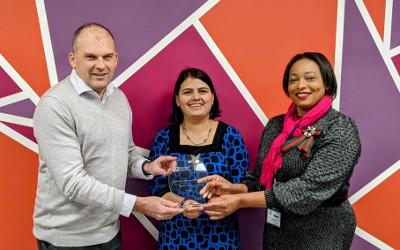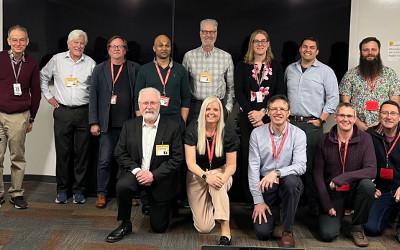People’s Choice Award-winning OU researchers reflect in new videos

2022 People’s Choice Award winners Dr Margaret Ebubedike and Dr Saraswati Dawadi reflect on how it felt to have their work recognised by the general public in two new videos.
The researchers' project received the most public votes among four remarkable research projects shortlisted for the award.
In the first video, they share how their life experiences greatly affected the decision to pursue challenging research to empower human trafficking survivors and the broader impact their work will have across the globe.
They also expand on the importance of implementing their research at a grassroots level in the communities supporting human trafficking survivors, where they hope to create a sustainable, lasting impact.
Having our research recognized by the general public is really a fantastic experience, particularly for us. Saraswati and I, we worked really hard on this project and this project is an under-researched area. It's an area of high importance for sadly under researched. So when the project was recognized by the general public, we felt really, also about that recognition. Most importantly, we felt that finally the voices of these girls have been heard. And because their voices have been heard, an action will happen and the girls will no longer be at risk of being re-trafficked.
Yeah, I mean, for me, to be honest with you, it is somehow connected to my own life experience. I grew up in a very remote part of my country and both of my parents were illiterate and a few of my siblings, they didn't get any opportunity to go to school, so they cannot read and write. And that's why I have seen the kind of real challenges that women and girls from marginalized communities go in their everyday lives. When I was a child, a young girl from my village was trafficked to India. We heard the news and the whole village was distraught. And I can truly understand that human trafficking does not only affect the girls or women who, I mean, the individual person who is trafficked, but it also affects the whole family or also it has impact on the community. 14 girls are trafficked to India every single day. That's why I really want to contribute to controlling human trafficking in Nepal and maybe in other countries as well. So that's why I really wanted to carry out this research.
The broad aim of our research is actually to improve the lives of human trafficking survivors. And the long-term impact of this research is to ensure that no girl is at risk of being re-trafficked anymore. We identified from our previous research that some of those girls who have been trafficked fall short of this aspiration, they lack this desired aspirational agency to say no to these sort of advances, to fall at risk of being trafficked.
So we hope that through our research that we will be able to support those girls to raise their aspirational agencies so in future, girls will no longer be at risk of being trafficked. We really want to see them to have a loving and caring family. Like at the time when we worked with them, they were staying in our rehabilitation centres, particularly in the context of Nepal. I still remember they really want to go back to their family, they want to go back to the community, but their family is not ready to accept them back because being a victim of sex trafficking, they have a kind of socialistic mind in their community. So the community is not ready to accept them back. The family is not ready to accept them back. But these young girls who became a victim, so they really want to go back, they want to have their own family. It is really important to work with community to raise their awareness. So that's why we are trying our best to do that. So yeah, I mean both raising their aspirations and then also helping them to go back to their family or to their community.
In the second video, Margaret and Saraswati explore how being empowered by the OU to undertake co-creative research within the communities themselves, enabled them to establish links with key stakeholders and other research teams within the community.
We'll be able to have a lasting impact of our project. That's why we are not only working with the victims of sex trafficking, we are also working with key stakeholders, policy makers. We had representatives from different NGOs and INGOs that are working for those girls, we also had representatives from the police department, we also had some lawyers. So first we want to see a kind of policy level impact from the top and then we also want to work with community and also we want to see policy at the grassroots level. That's why we hope that because we are working with key stakeholders and also with community so we hope that we can bring a positive impact or sustainable impact of our project.
We are reaching out to the grassroots level from that bottom-up approach where we engage with the communities, the girls themselves and we include their voices in this research. The reason why we're including their voices in this research is because the policies that are going to be designed is meant for them. So, it's important for their own experience and their voice to be central in this whole discussion because we notice that over time their voices are missing from this table, this discussion. So including their voices means that they are part of that policymaking process. Their experiences, which are very unique to them, are being heard and it's been included in the whole process. So when they are part of a design of an intervention, that intervention becomes a lasting and sustainable form. Because research evidence shows that when people are part of the decision making project, we try to sustain it.
And the OU has helped us in achieving this by linking us with the community stakeholders and the research teams we work with in this community. And this is something that OU has done really very well. We have been trained to have those research skills that enables us to go in there and carry out research that is co-creative with the communities. I think the greatest thing for me joining the OU is this aspect of having to do co-creative research with the communities. And this is an experience I've gained from working in the OU where we go, we're not going into that community to help solve a problem. We are going there to understand that the community know, have their own expertise and knowledge of how to solve their own problem. So we're only going there to support them, to ensure that they advance what they are doing and make it better and make it more sustainable. Thank you.
What the OU do with research is different from what many other universities do with their research. Like, I mean, here at the Open University, our research aims to bring a sustainable change in the society. So what we do here is like in our example as well, what we did was we started with research activities. We really wanted to understand the kind of challenges that the victims of sex trafficking they are facing in their lives and what kind of need they have. With the evidence that we collected or with our learnings from our research activities, we designed we organize other activities to work with key stakeholders that work for the victims of sex trafficking. So that's why we use resource as a support to work with key people, our key stakeholders, to bring sustainable tenants in these societies.
The OU's approach to research is not the 'saviour's' approach to a community. They understand that these communities are experts in their own experiences. And so what we do at the OU is that we engage the communities themselves. We're bringing their voices, their experiences, their perspectives into our research design. Because we understand that when we bring in the voices and the experience of those who are central in our research into the design, then those research projects will actually be accepted by the community.
We've got a lot of research where the research is coming from the Global North down to the Global South and just stay two weeks and carry data. We don't do extractive research in the OU. We do research that is beneficial to the community. We do research that helps sustain the community, that builds capacity within the community. I think that's one of the things that one of the highlights for me when I joined the OU was to understand that our research approach at the OU is not extractive. It's actually giving back to the community and gaining experience. It's a shared responsibility between the community and the researchers. We work together with the girls to design interventions that are sustainable, interventions that are sensitive to their experiences, interventions that actually understand the journey of trauma they've been through without neglecting that experience.
So I think when we work in that kind of co-creative approach, it's a buy-in for us, really. It's a buy-in because we're not going to be meeting resistance in this communities. The communities understand that we are there to support what they know is working to get better, not coming to 'bring in the solution'. Because we found out from evidence that when you come in with that deficit model into a community that either it hits the rock or it doesn't succeed beyond that research process or that research life, after the research life, the project just dies. But when the community is part of that process, then that project can be sustained by the communities themselves. We are really encouraged to work for the community.
So whenever we plan for our resource project, then we first think about what can we do for the community, for our research community. So we are really mindful about the kind of impact we can have from our research, or from our other activities that we do. So we are, I think we both of us, we are really passionate about making a positive impact of our work in this society. We really want to contribute to stopping this sex trafficking, which is a heinous war from this world. And then we want to contribute to making this world a better place to live.
You may also be interested in:
Quarterly Review of Research
Read our Quarterly Review of Research to learn about our latest quality academic output.

Contact our news team
For all out of hours enquiries, please telephone +44 (0)7901 515891
News & articles
- OU signs significant deal for company to make valves for satellites 25th April 2024
- Shaping a sustainable future – the power of Open Research 24th April 2024
- New research into Pompeii to be revealed by OU/BBC co-production 12th April 2024
